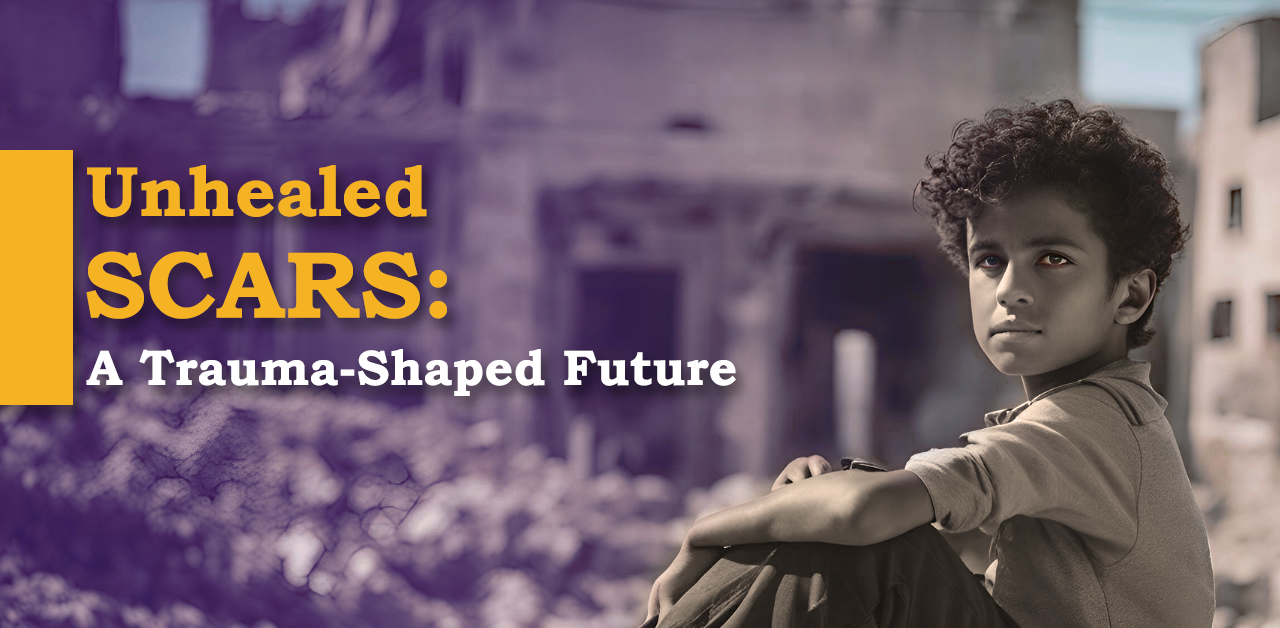 29 Apr 2024
29 Apr 2024
Unhealed Scars: Unresolved Childhood Trauma’s Ripple Effect in Conflict Areas
BY: Dr. Ahmad Sammy
Articles
Imagine a generation raised on the soundtrack of bombs and the sight of destroyed buildings. For numerous youngsters living in conflict areas like Gaza, where constant bloodshed leaves severe emotional wounds, this is their sad reality. Leaving these kids to struggle with untreated trauma has far-reaching effects that go well beyond personal misery and have a significant influence on international society.
The Gaza Case: A Shattered Generation
Research indicates that a startlingly high number of Gaza’s children suffer from PTSD. Mental health problems have long plagued children under the age of 18, who account for 47% of the 2.3 million residents of the Gaza Strip. Before the recent violence, four out of every five kids reported having PTSD, depression, anxiety, or fear. Previous research also showed that an even larger percentage of kids had mental health problems that were impeding their growth and education.
According to reports such as the one published by the Euro-Mediterranean Human Rights Monitor, around 640,000 children in the Gaza Strip have had their homes destroyed or damaged, leaving them without a place to live, and between 24,000 and 25,000 children have lost one or both of their parents. All of this led to an enormous mental health toll on children in Gaza, to the extent that almost 100 percent of these children are in imminent need of mental health and psychosocial support, according to a recent statement by UNICEF.
“The scars of this war are not just physical ones, We’re seeing an enormous mental health toll on children in Gaza. UNICEF estimates that 100 percent of the children here need mental health and psychosocial support.”
Tess Ingram, UNICEF spokesperson | April, 2024
Trauma-Shaped Future: A Worldwide Issue
Childhood trauma can take many different forms if left untreated:
- Mental Health Crisis: Depression, substance misuse, and self-harm are all fostered by unresolved PTSD. The burden on mental health resources has a knock-on effect on healthcare systems throughout the world.
- Cycle of Violence: Kids who witness violence firsthand are more likely to commit acts of violence themselves as adults, which could prolong hostilities, destabilize areas, and raise the possibility of threats to international security.
- Economic Downturn: Traumatized adolescents frequently find it difficult to obtain jobs and make meaningful contributions to society; as a result, they will impede economic growth, which will have an effect on commerce and development on a local and international level.
Worldwide Accountability: Healing the Damage
It is the duty of the international community as a whole to address this problem by putting some of these possible answers into practice:
- More Humanitarian Aid: Provide funding for trauma-informed mental health treatments in areas of violence. Educate local mental health providers so they can handle the unique needs of children affected by war.
- Advocacy and Awareness: Educate people worldwide about the long-term effects of childhood trauma. Put pressure on combatants to give civilian safety—especially that of children—first priority.
- Education and Support: Include curricula on mental health issues in schools located in conflict areas. Give kids safe places to process their experiences and support groups.
Investing in the Future
We run the risk of raising a generation of lost souls with unseen scars if we ignore childhood trauma in war-torn areas. It is not only morally right to invest in their mental health; it is also economically and globally necessary for security. Our ability to mend the scars of war, one child at a time, will determine the health of our world in the future.
Gaza’s children serve as a striking metaphor for a more serious worldwide issue. Through community effort and recognition of the extensive effects of unresolved childhood trauma, we can create a world in which every kid has the chance to recover and flourish.
